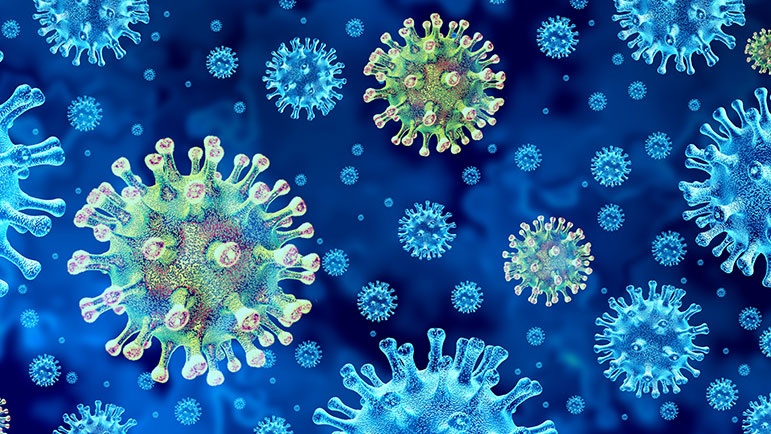Two Rush University research scientists have received a $1.4 million grant to study "breakthrough" infections of COVID-19 in vaccinated people who have received booster shots. Rush will share the two-year grant from the Skokie, Illinois-based Walder Foundation with Loyola University's Stritch School of Medicine.
The timely study has three objectives, says Jeffrey Schneider PhD, assistant professor in the Department of Microbial Pathogens and Immunity at Rush Medical College, and a co-principal investigator on the study:
- To better understand why some vaccinated people get breakthrough infections and others do not
- To gauge the durability of the antibody response generated by boosters and breakthroughs in vaccinated individuals
- To determine whether boosters can help immunocompromised people, many of whom haven't mustered much of an antibody response to the first two doses of the vaccine.
"We're trying to understand the effects of booster shots and breakthrough infection on long-term antibody durability" against COVID-19, says Schneider, who will oversee the first project, looking for characteristics in plasma antibodies that might predispose people to get a breakthrough infection.
He and Jeffrey Borgia PhD, associate professor of anatomy and cell biology, the director of the Rush University Cancer Center Biorepository, and an expert on the use of patient specimens to develop novel diagnostic tests to help guide treatment decisions, will work with Susan Uprichard, PhD, who directs the Infectious Disease and Immunology Research Institute at Stritch. The three will build on earlier individual projects and collaborations funded by through the Walder Foundation’s Chicago CAN initiative that they have undertaken since COVID-19 appeared in 2020.
Borgia will lead the second project, using a blood test for COVID-19 he developed at Rush to specifically examine the durability of the immune response to vaccination and breakthrough infections, and Uprichard will lead the third, focusing on immunocompromised patients.
The researchers, supported by colleagues at both institutions, Schneider says, hope to establish protocols in the next year to predict which boosted people are likely to get sick from COVID-19, and which of those might become severely ill. In the second year of the two-year grant, they will build a data repository for researchers to use going forward, Schneider says.
The Walder Foundation grant will enable the creation of a virtually accessible bank of data on cells and plasma taken from hundreds of subjects during these and related projects that can facilitate ongoing collaboration between Rush and Loyola. The hope is that this data will eventually be shared with researchers from other institutions through the Chicagoland COVID-19 Commons, a local research data collective.
"This study is not only about understanding the science, it's also about how to bring people together to tackle it from all angles," Schneider says. "There is so much we can learn from each other."
The first vaccines to prevent infection from SARS-CoV-2, the virus that causes COVID-19, arrived early in 2021 and provided protection against severe disease. However, antibody levels in vaccinated individuals declined quickly, which led to infections that "broke through" the defenses the vaccines had established in the body's immune system. Additional booster shots administered several months later strengthened individuals' immune response, but breakthrough infections continue to occur in fully vaccinated individuals, especially with the recent appearance of the omicron strain.
Schneider, who came to Rush in 2019, had studied antibody responses to HIV, the tenacious virus that causes AIDS, for nearly a decade. As a result of lessons learned in that research, as well as considerable spadework led by Lena Al-Harthi PhD, chair of Rush's Department of Microbial Pathogens and Immunity, Schneider says, "we had protocols in place at the start of the pandemic to begin looking at antibody responses to SARS-CoV-2."
The Walder Foundation-funded studies have significant long-term implications for public health, Schneider says. "I think we can learn a lot from COVID, and help establish a model for responding quickly to pandemics," he says. Meanwhile, "We're going to do as much as we can, and publish as much as we can, on the problem at hand."

